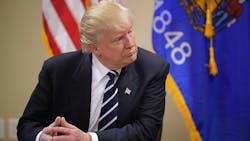Trump Visa Changes Toughen Hiring of Foreign Programmers
The U.S. Citizenship and Immigration Services agency issued a memorandum that makes it harder for companies to bring foreign technology workers to the U.S. using the H-1B visa process.
The new guidelines, issued late Friday, require additional information for computer programmers applying for the work visa to prove the jobs are complicated and require more advanced knowledge and experience. The new policy is effective immediately, so it will change how companies apply for the visas in an annual lottery process that begins Monday.
Outsourcing firms, which have faced the most amount of criticism, stand to lose the most. Shares of Cognizant Technology Solutions Corp., Infosys Ltd., Wipro Ltd. and Accenture Plc each slipped more than 1% in Monday afternoon trading in New York.
The changes don’t explicitly prohibit applications for a specific type of job. Instead, they bring more scrutiny to those for computer programmers doing the simplest jobs.
"This is a step in the right direction in terms of tightening up the eligibility," said Ron Hira, an associate professor at Howard University, who has done extensive research on the H-1B program. "You’re going to have to beef up your argument for why you need this person."
The agency issued a second memo on Monday laying out new measures to combat what it called "fraud and abuse" in the H-1B program. It also seemed to target outsourcing companies, saying it would focus inspections on workplaces with the largest percentage of H-1B workers, and those with employees who do IT work for other companies. The Justice Department also warned employers applying for the visas not to discriminate against U.S. workers.
President Donald Trump has called for companies to hire more Americans instead of outsourcing jobs to countries with cheaper labor or bringing in lower-paid foreign workers. The H-1B program has been a target for changes. Last month, the immigration department suspended a program that expedited visa processing for certain skilled workers who paid extra, which some critics saw as a first step to dismantling the H-1B program altogether.
Technology and outsourcing companies are the largest users of the H-1B program. India-based outsourcing companies receive a disproportionate percentage of the visas and tend to pay lower salaries than U.S.-based tech firms. Employers sought H-1B visas for more than 13,000 computer programmers in 2016, citing an average salary of about $72,000, according to Bloomberg Intelligence analyst Caitlin Webber.
Computer programmers made up about 12% of all H-1B applications approved by the Department of Labor in 2015. Of those, 41% were for positions at the lowest wage level, defined as jobs requiring people to perform routine tasks that require them to exercise little judgment on their own. The guidelines issued Friday refer specifically to entry-level computer programmers, which the U.S. Department of Labor defines as those who write and test code to allow computer applications and software to work properly.
“This is not a change in policy on H-1B and H-1B1 eligibility in computer-related fields,” CeCe Gwathmey, a spokeswoman for the immigration agency, said in an email, referencing the March 31 document. The memorandum rescinded a 17-year-old set of guidelines that “relied on obsolete information and had not been used as a standard” to decide on H-1B petitions for many years, she said.
Microsoft Corp., Facebook Inc., Alphabet Inc., IBM and Accenture didn’t immediately have a comment.
About the Author
Bloomberg
Licensed content from Bloomberg, copyright 2016.
